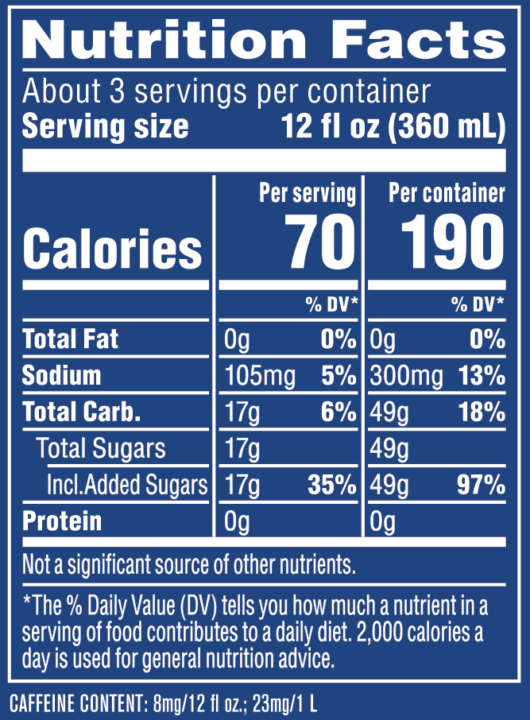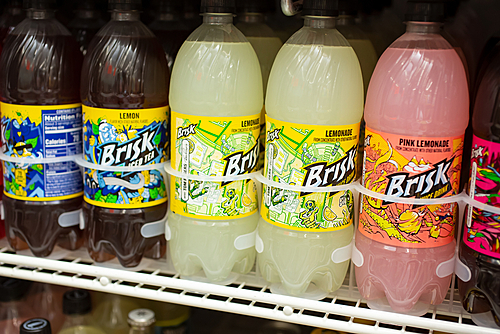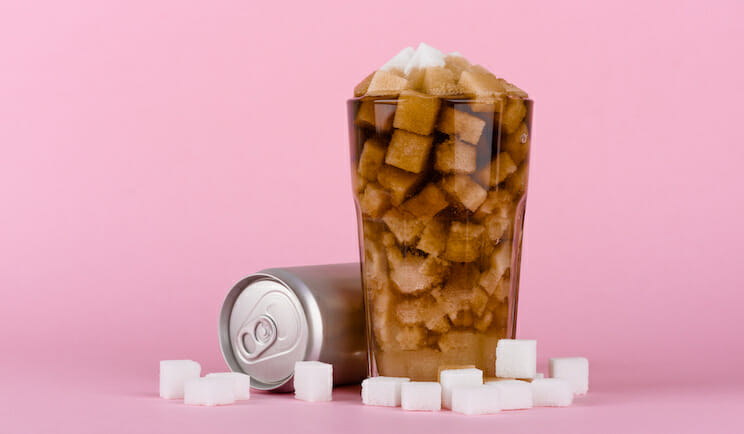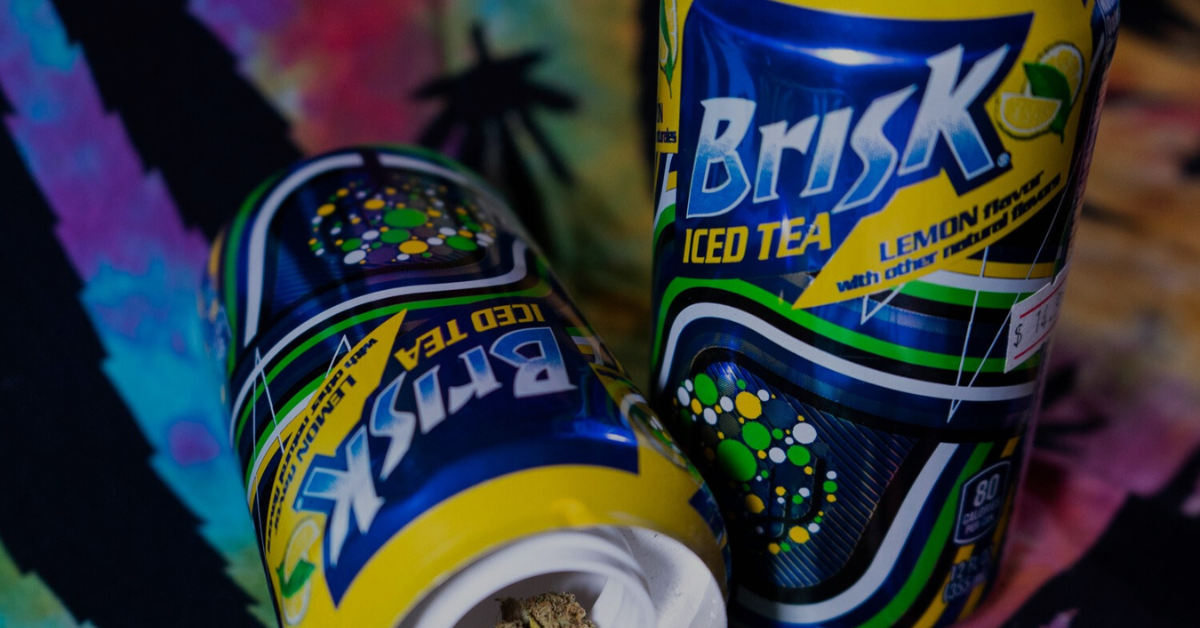Approved By » Esther Howard (Nutritionist)
When the summer heat hits, few beverages are as refreshing as a chilled glass of iced tea.
Among the many popular iced tea brands, Brisk Iced Tea has carved out a loyal following with its bold flavors and convenient packaging.
However, the question remains: is Brisk Iced Tea good for you? In this article, we’ll dive deep into the potential pros and cons of Brisk Iced Tea, so you can make an informed decision about incorporating it into your diet.
Is Brisk Iced Tea Good for You?
Brisk Iced Tea can be part of a healthy diet in moderation, but it’s essential to consider the sugar content and ingredient list.
While it provides antioxidants from the tea leaves, some varieties are loaded with added sugars and artificial sweeteners, which can have negative health implications if consumed in excess.
Nutritional Values of Brisk Iced Tea
Let’s explore the nutritional values of Brisk Iced Tea:
- A typical 8-ounce (227 grams) serving of Sweet Brisk Iced Tea contains the following:
- Calories: 90
- Carbohydrates: 25 grams (25 grams net carbs)
- Fat: 0 grams
- Protein: 0 grams
- Sodium: 65 milligrams (3% of daily value)
- Fiber: 0 grams
- Glucose: 25 grams
- Vitamins and Minerals:
- Vitamin A: 0 micrograms (0% of daily value)
- Vitamin C: 0 milligrams (0% of daily value)
- Calcium: 0 milligrams (0% of daily value)
- Iron: 0 milligrams (0% of daily value)

Keep in mind that these values are based on a 2,000-calorie diet. Brisk Iced Tea also provides small amounts of vitamins and minerals, including calcium, iron, and potassium.
However, the most notable benefit comes from the tea leaves themselves, which contain antioxidants.
Potential Benefits of Brisk Iced Tea
Let’s start by exploring the potential benefits of Brisk Iced Tea:
Antioxidant Powerhouse
One of the primary advantages of Brisk Iced Tea is its antioxidant content. Tea leaves are rich in compounds like flavonoids and catechins, which are known for their antioxidant properties.
These antioxidants can help protect your cells from damage caused by free radicals, which are unstable molecules that can contribute to the development of various chronic diseases.

By consuming Brisk Iced Tea, you’re essentially drinking a refreshing beverage that provides a dose of these beneficial antioxidants.
Regular intake of antioxidants has been associated with a reduced risk of heart disease, certain cancers, and age-related cognitive decline.
Hydration on the Go
Staying hydrated is crucial for overall health and well-being, and Brisk Iced Tea can contribute to your daily fluid intake.
While it’s not a substitute for plain water, the iced tea variety can be a tasty alternative, especially when you’re on the go or need a change of pace.
By the way, you may read another article about how to stay properly hydrated and find 10 hydrating foods that can help.
Brisk Iced Tea’s convenient bottled packaging makes it easy to grab and enjoy, whether you’re running errands, at the office, or enjoying outdoor activities.
Just be mindful of the caffeine content, as excessive caffeine can have a diuretic effect, potentially leading to dehydration.
Guilt-Free Caffeine Kick
If you’re someone who enjoys a mild caffeine boost without the jitters or crashes associated with coffee or energy drinks, Brisk Iced Tea could be a suitable option.
The caffeine content in iced tea is generally lower than that of coffee, making it a more moderate source of the stimulant.
This caffeine kick can help improve mental alertness, focus, and productivity, making Brisk Iced Tea a potential pick-me-up during those mid-afternoon slumps or long study sessions.
The Drawbacks of Brisk Iced Tea
While Brisk Iced Tea does offer some potential benefits, it’s crucial to acknowledge its drawbacks and potential health concerns:
Sugar Overload
One of the most significant downsides of Brisk Iced Tea is its high sugar content. Many varieties are laden with added sugars, primarily in the form of high fructose corn syrup.
A typical 16-ounce bottle can contain a whopping 36 grams of sugar, which is equivalent to nearly 9 teaspoons.

Consuming excessive amounts of added sugars has been linked to various health issues, including weight gain, tooth decay, and an increased risk of type 2 diabetes, heart disease, and fatty liver disease.
If you choose to indulge in Brisk Iced Tea, it’s best to opt for unsweetened or lightly sweetened versions to minimize your sugar intake.
Artificial Sweetener Concerns
To cater to those seeking a lower-calorie option, some Brisk Iced Tea varieties are sweetened with artificial sweeteners like sucralose or aspartame.
While these alternatives can reduce the calorie and sugar content, they come with their own set of controversies and potential health implications.
Some studies have suggested that artificial sweeteners may contribute to weight gain, disrupt gut health, and potentially increase the risk of certain chronic diseases.
Additionally, some individuals may experience adverse reactions or sensitivities to these sweeteners.
Caffeine Sensitivity
While the caffeine content in Brisk Iced Tea is generally moderate, it’s essential to consider individual caffeine sensitivity.
Those who are sensitive to caffeine may experience negative side effects such as jitters, anxiety, headaches, or sleep disturbances when consuming caffeinated beverages like Brisk Iced Tea.
View this post on Instagram
Individuals with certain medical conditions, such as heart arrhythmias or anxiety disorders, may need to be particularly cautious about their caffeine intake and consult with a healthcare professional before consuming Brisk Iced Tea or other caffeinated beverages.
Hydration Concerns
While Brisk Iced Tea can contribute to your daily fluid intake, it’s important to note that it is not as hydrating as plain water.
The presence of caffeine and other additives, such as sugars and artificial sweeteners, can have a diuretic effect, potentially leading to dehydration if consumed in excess.
For optimal hydration, it’s recommended to prioritize water as your primary source of fluid intake and consume Brisk Iced Tea in moderation as a complementary beverage.
Is Brisk Iced Tea Good for You?
After weighing the pros and cons, it’s evident that Brisk Iced Tea can be a part of a healthy diet, but moderation is key.
If you enjoy the taste of Brisk Iced Tea, opt for unsweetened or lightly sweetened varieties to minimize your intake of added sugars and artificial sweeteners.
Remember, while Brisk Iced Tea provides antioxidants and a moderate caffeine boost, it should not be treated as a substitute for water or a primary source of hydration.
Instead, consider it an occasional treat or a refreshing alternative to sugary sodas or high-calorie beverages.
If you have specific health concerns or sensitivities, it’s always best to consult with a healthcare professional or a registered dietitian to determine the appropriate role of Brisk Iced Tea in your diet.
Ultimately, the key to enjoying Brisk Iced Tea lies in being mindful of your overall dietary habits and maintaining a balanced approach to your beverage choices.
References & Resources
- https://www.fatsecret.com/calories-nutrition/lipton/brisk-lemon-iced-tea-(can)
- https://fdc.nal.usda.gov/fdc-app.html#/food-details/175111/nutrients
- https://www.reddit.com/r/Celiac/comments/10qil3h/has_anyone_had_any_problems_with_brisk_iced_tea/
- https://facts.net/lifestyle/food/20-brisk-iced-tea-nutrition-facts/
- https://www.teawithtae.com/blogs/afternoon-tea/5-health-benefits-iced-tea

